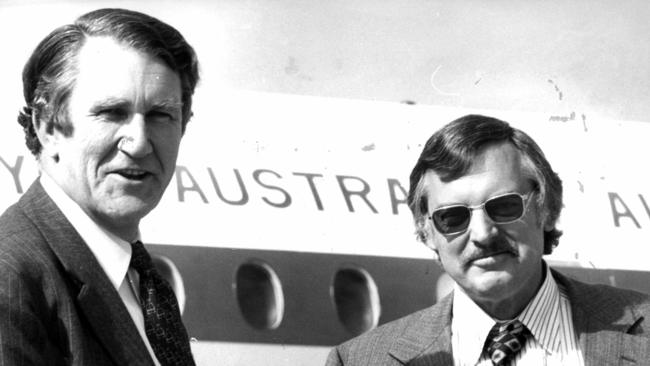David Barnett’s shorthand saved the day during Whitlam’s China visit
An intelligent man of morality and principle, David Barnett was Malcolm Fraser’s press secretary - but it was always Australia’s interests he had at heart.

David Barnett Journalist.
Born Sydney, September 18, 1931; died Canberra, August 6, aged 90.
-
Good journalists record history. Great journalists become part of it. David Barnett was one of the greats.
His moment came in Beijing on a hot July night in 1971. The Chinese were, as usual, opaque. Barnett was travelling as part of a hand-picked clutch of reporters sanctioned by the Chinese government. Despite the heat, the Australians were told at their hotel to put on coats and ties, that they were going to the theatre. They were. It was just no one knew that the stage was to be global.
The bus ride was short, to the Great Hall of the People. Waiting there was premier Zhou Enlai, the second most powerful man in China, and Australia’s opposition leader Gough Whitlam. The visit, initiated by Whitlam, was an attempt to reimagine Australia’s foreign policy.
It was a bold break from the Cold War narrative of the times. China, anxious to begin reasserting its role in global geopolitics, realised the significance of Whitlam’s overture.
Liberal prime minister Billy McMahon ridiculed Whitlam as a communist fellow traveller. But US national security adviser Henry Kissinger was already en route planning a visit by Richard Nixon. Whitlam had read the winds of history. At the following election McMahon was consigned to the dustbin of same.
Back at the Great Hall, Zhou and Whitlam both agreed this shift in global tectonics had to be recorded. The only man with the skills was Barnett. “He was the last of the straight backs,” remembered one. “Pitman.” It was a reference to Barnett’s immaculate shorthand in the days before handheld tape recorders.
Over 90 minutes Barnett wrote every word, including Whitlam asking Zhou his view on the impact of the French Revolution. Zhou famously paused and replied: “Too early to tell.” That night Barnett filed his world exclusive, but then generously shared his copy with the other Australian journalists present.
Barnett dropped out of university to become a copy boy on the Sydney Sun. Few people knew that his heritage was part Maori. His farm, Tainui, was named after his people’s war canoes.
Because he was press secretary to Malcolm Fraser during the Dismissal, Barnett was often caricatured as arch conservative.
But he had a fierce sense of social justice, dying an atheist unable to believe any god would allow the Holocaust; his best friend’s father died in the death march out of Auschwitz. Once, when working in Nairobi, he attended a pool party. An Indian man dived in. Everybody else got out. The Indian was “coloured”. To the astonishment of his predominantly white fellow guests, Barnett promptly jumped in to join his new Indian friend.
He came to work as Fraser’s press secretary via stints in Fleet Street, where he met his first wife, Maureen, then Cyprus, France, Japan, India and Kenya.
In Japan he earned a black belt in judo and it came in handy during the Dismissal years when Barnett’s duties extended to physically protecting Fraser. He’d joined Fraser in opposition genuinely believing Whitlam’s policies were destroying the country.
He revolutionised the relationship between the prime minister and the media. Before Barnett, prime ministerial press conferences were rare. He invented the concept of the “doors”, where journalists could question the prime minister as he entered the parliament. These strategies anticipated the 24/7 news cycle and the value of the government getting its message out proactively.
The visceral partisanship of the press gallery following the Dismissal saw Barnett become a hate figure, an ignorant judgment. His relationship with Fraser was never warm, rather built on hard-headed respect. They argued frequently. But it was a measure of both that Fraser listened. Barnett remained loyal but later drew closer to the John Howard-led group of Liberals who believed Fraser lacked policy ambition. Howard this week described him as a “good friend”.
Another great of journalism, this newspaper’s Paul Kelly, said: “David Barnett was an important and influential figure in the press gallery … a highly capable and senior journalist who brought an independent perspective to politics. (He) managed a contentious period of our politics with diligence and professionalism. He had an enduring passion for what he saw as Australia’s national interest.”
David is survived by his wife Pru Goward and daughters Alice and Susan Barnett, stepdaughters Penelope Fischer and Tziporah Malka, and grandsons Andrew and Nicholas Symons. Two children, Simon and Sarah, predeceased him.
A memorial and reception celebrating his life will be held on Thursday at Old Parliament House, Canberra.



To join the conversation, please log in. Don't have an account? Register
Join the conversation, you are commenting as Logout